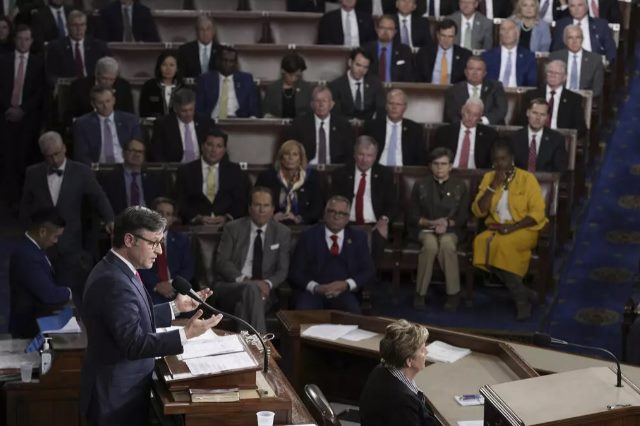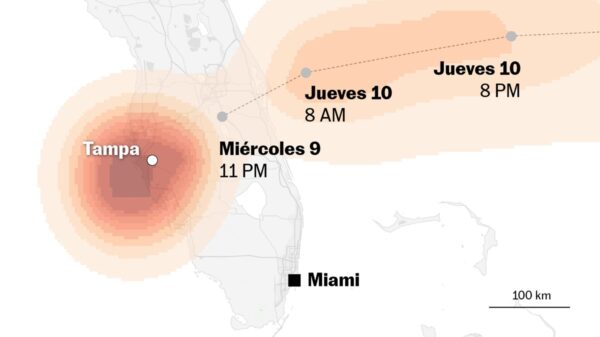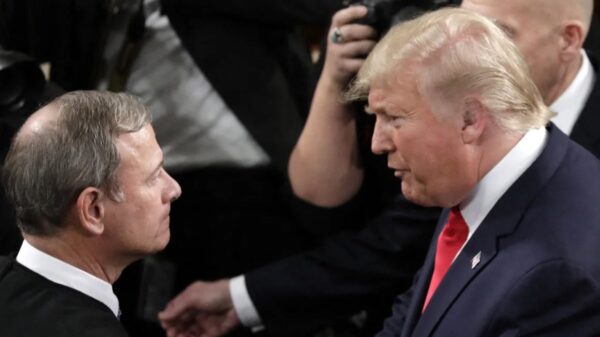U.S. President Joe Biden signed legislation this Saturday to prevent a government shutdown ahead of Christmas. This action ends days of turmoil in Washington after Congress approved a bipartisan budget plan just after the deadline, rejecting Donald Trump’s central demand during the negotiations.
The agreement to avert a U.S. government shutdown funds the administration at current levels until March 14 and provides $100 billion in disaster relief and $10 billion in agricultural assistance for workers in that sector.
House Speaker Mike Johnson, a Republican, had emphasized that "we will meet our obligations" and that Congress would not allow federal operations to shut down. However, the outcome remained uncertain after a tumultuous week in which Donald Trump insisted that the deal include an increase in the government’s debt limit. Otherwise, he said, "let the shutdowns begin now."
Johnson’s revised plan was approved by a vote of 366-34 and passed by the Senate 85-11 after midnight. By that time, the White House announced it had halted preparations for a shutdown.
"There will be no government shutdown," stressed Senate Majority Leader Chuck Schumer.
Johnson, who had spoken with Trump after the House vote, stated that the outcome was "a good result for the country" and that the former president "is certainly happy with this result as well."
The final product was Johnson’s third attempt to achieve one of the federal government’s basic requirements: keeping it open. The challenges raised questions about whether Johnson can maintain his position amid angry Republican colleagues and work alongside Trump and his billionaire ally Elon Musk, who had been influencing legislative moves from afar.
The House is scheduled to elect its next Speaker on January 3, 2025, when the new Congress convenes. Republicans will hold a razor-thin majority of 220-215, leaving Johnson little room for error as he tries to secure the Speaker’s gavel.
Discontent within the Republican Party ranks
Republican Representative Andy Harris of Maryland criticized his party for the deficit spending in the bill and stated that he was now "undecided" about the party’s leadership. Others have also expressed their dissatisfaction with Johnson.
However, Trump’s demand was nearly an impossible request, and Johnson had little choice but to work around that pressure. He knew there wouldn’t be enough support within the Republican majority alone to pass any funding package because many Republicans prefer to cut federal government spending and would not allow for more debt.
Instead, Republicans, who will have full control of the White House, the House of Representatives, and the Senate next year with ambitious plans for tax cuts and other priorities, are demonstrating that they must routinely rely on Democrats for the votes needed to keep routine government operations running.
The federal debt stands at approximately $36 trillion, and the post-Covid-19 pandemic surge in inflation has increased government borrowing costs to the point that debt servicing next year will surpass national security spending. The last time lawmakers raised the debt ceiling was in June 2023. Instead of raising it by a specific dollar amount, they suspended the debt limit until January 1, 2025.

There is no need to raise that limit now because the Treasury Department can begin using what it calls "extraordinary measures" to ensure that the United States does not default on its debt. Some estimate that these accounting maneuvers could delay the default deadline until the summer of 2025. But this is what Trump wanted to avoid because a raise would be needed while he was president.
Republican leaders assured that the debt ceiling would be debated as part of tax and border packages in the new year. Republicans made a handshake deal to raise the debt ceiling at that time while also cutting $2.5 trillion in spending over ten years.
Essentially, it was the same deal that failed on Thursday night, minus Trump’s demand for debt. But it is much smaller than the original deal Johnson reached with Democratic and Republican leaders: a 1,500-page bill that Trump and Musk rejected, forcing him to start over. It was filled with a long list of other bills, including highly criticized pay raises for lawmakers, but also other measures with broad bipartisan support that now have a harder path to becoming law.
Trump, who has not yet been sworn in, is showing power, but also the limits of his influence in Congress, as he intervenes and orchestrates matters from Mar-a-Lago alongside Musk, who is heading the new Department of Government Efficiency.






















